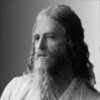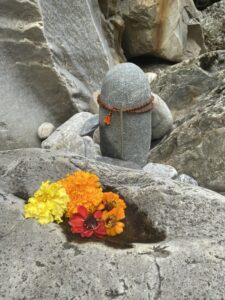A gentleman is taking an evening stroll when he notices a friend down on his hands and knees, crawling along the street. He asks, “What’s the problem?”
“I lost my keys,” replies the friend.
The fellow lowers himself to the cement and helps his pal search. The two look for quite some time with no success. Finally, the man asks, “Are you sure you lost your keys here?”
“Oh no,” comes the response, “I lost them down the block.”
“Down the block,” says our guy, rightfully surprised, “then why are we looking here?”
The friend explains, “It’s dark down the block, the light is better here.”
Life seems filled with complex problems. Our collective world appears so elaborate it’s hard to figure out how to solve the various knotty dilemmas of political conflict, the environment, economics, social justice, what to speak of getting along with friends and colleagues. Even in our own little worlds, caring for ourselves and our families seems to require us to be skillful in everything from time management to child psychology, to plumbing. It seems nigh impossible for anyone to have the time, energy, and resources to solve life’s problems and actually live in peace.
The yogic tradition tells us, however, that the problems we see in the world are like leaves on the branches of a vast tree. We can pluck the leaves, water the leaves, prune the leaves, do whatever we wish with the leaves, but the tree will continue to sprout new ones. The only remedy that will work is to take an ax to the stump and cut the darn thing down at its base.
The base of all of our problems say the great yogis, is avidya. Vidya means “wisdom” and a is a negative prefix. Avidya, then, is a lack of wisdom. Although we certainly have plenty of knowledge– we know how to operate cars, computers, atm machines, and cell phones — this knowledge is not wisdom. Wisdom is to know your own Self. Ignorance, then, is to not know who you really are.
At first, it seems preposterous that we don’t know who we really are. How can someone of sane mind not know who they are? Anyone can check their drivers license and prove to all and sundry precisely who they are. Are the yogis saying we suffer from a mental disorder, or something similar, that we don’t know the obvious?
Well, the yogis describe our true nature as being sat-chid-ananda, “eternally conscious and joyful.” Yet few actually experience this as our true nature. Most of the time we feel our nature to be one of hurry, worry, fear, and self-doubt. The yogis say that we have simply made a mistake with the way we use our minds., with the way we think about ourselves. So, yes, the sages do indeed proclaim we are suffering from a mental disorder as we are not thinking in a manner that reflects the truth. The good news is that because the disorder is in our own minds, we have the power, if we can just claim it, to remedy the mistake and heal the situation.
The nature of avidya is that we believe ourselves to be something different than our eternal being. We identify ourselves with our biology and social roles– our bodies and personalities. We experience ourselves as being the effect of causes outside of ourselves over which we have no power or control. This is the opposite of the teachings of our great tradition which affirms we are not passive slaves driven by forces beyond our control. No, we are immortal souls, one with the omnipotence of our creator.
Different belief systems describe our nature based on their ideologies. Psychology, sociology, and anthropology tell us that our identity is shaped by external forces that determine who we are. Certainly, there are external forces that influence us, but yogic philosophy states that this is not the entire story. Likewise, religious traditions often tell us that human nature is small and meek, we cannot know God directly but must adopt a dogma based on scripture. The yogic philosophy, on the other hand, powerfully states that beliefs are irrelevant and impotent. Value and significance are given to direct personal revelation of the divine.
Once we suffer from the disease of ignorance we become prone to its symptoms. The first is called asmita or ahamkara, which means “ego.” The ego is the false identity we adopt. This identity is formed at a deep subconscious level and is based on the powerful energy of confusion. Identifying with the ego, we find ourselves nearly overwhelmed by fear and loneliness. To deal with this suffering, we engage in raga, seeking that which will bring us some pleasure, and dvaisha, trying to avoid that which brings pain. As we have all noticed, however, our definitions of happiness and sadness change with time, and, even worse, our happiness based on external acquisitions is terribly fleeting. Then comes the culmination of the ailment of ignorance, abhinivesha, fear of change. We try and establish some degree of security for ourselves, only to have our security structures fail again, and again, and again.
Into this complex mess come the yogis who cut through the muck and get to the root of the problem. They suggest that band-aids can’t heal the deep wound of ignorance, only amrita, “the nectar of realization” can serve as the remedy. The realization of one’s true Self, beyond birth and death, transcendent to body and mind. And this nectar is not the providence of saints or a special, chosen select. No! It is the birthright of every man and woman. People just like us. All we have to do is accept the gift and take the medicine.
Turns out that the taking of the medicine is simple, but not necessarily easy. There is quite a bit of old conditioning to overcome, false belief systems to deconstruct, and old habits to deprogram. But, promise all the sages, all the yogic literature, and I give you my personal promise– It Can Be Done. Make this your affirmation, your mantra, your healing prayer — It Can Be Done. It takes some discipline, it takes regular yoga practice, and it takes a whole lot of humor– It Can Be Done. It just takes practice. Lots of practice. Daily practice. It Can Be Done.
Authentic yoga practice dispels the illusion that you are a limited body and mind. It gives a taste, small in the beginning, then deeper and swifter, of the reality of your being as eternal, conscious, and joyful. The mind becomes quieter, the heart opens gently, and the desire to serve others spontaneously arises. It is a fascinating paradox that the discovery of problems being generally insubstantial and self-created leaves one more compassionate and loving. This is the great yoga, or union, of “jnana”, or wisdom, and “bhakti,” or devotion.
There’s nothing sinful about having problems, making mistakes, or looking for lost keys in the wrong places. As we say around the Kailash Ashram: “Nobody is cool all the time.” Still, to begin to realize the real problem behind our superficial problems, and to take the medicine of yoga practice can bring benefits to body, mind, and soul that seem miraculous. Looking for the answer where the problem really lays, even when it is easier to search under the familiar streetlamps, provides us with the opportunity to awaken to our true nature, overcome our ignorance, and realize our Self. It Can Be Done.




